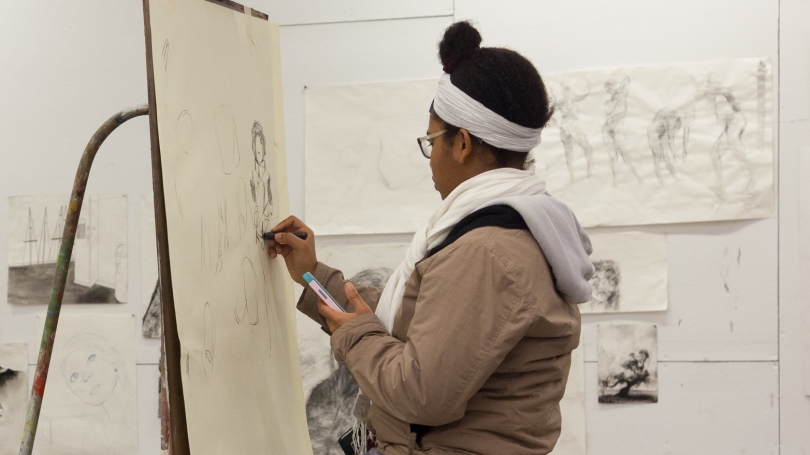
- About
- Consultation
- Programs
- Resources
- News & Events
Back to Top Nav
Back to Top Nav
Back to Top Nav
An active participant in social justice movements on campus, Dondei Dean ’17 has been studying the history of protests at Dartmouth since last fall to facilitate continuous, meaningful dialogue. A studio arts major from Los Angeles, Calif., she is a recipient of the Penelope W. and E. Roe Stamps IV Leadership Scholar Award, a monetary award to be used for research and learning beyond the classroom. Her project is titled “Women of Color’s Activism at Dartmouth: An Oral History” and is guided by Professor of History Annelise Orleck. Dean recently spoke to the Web Services Content Corps Team about her project.
How did your project come to fruition?
I have been involved in campus activism since my freshman year. I have thought a lot about the problems I see at Dartmouth. I drew on my experiences of activism and protesting here and I realized that students, administrators, and faculty have had the same conversations every four years. Once a class graduates, everything they know about what's been done at Dartmouth and the conversations they had about it are gone. I realized the need for an institutional memory of social justice movements so that people at Dartmouth could better contextualize themselves within Dartmouth’s protest history.
Why does your project matter? How can others benefit from your research?
It’s realizing that protests aren’t uncommon at Dartmouth and at other institutions and getting a real sense of how different protests connect to one another. Students in 1979 spray painted the Winter Carnival snow sculpture after someone at a hockey game dressed up as a stereotypical American Indian and skated onto the ice. And today we’re still having conversations about what it means to come from this legacy of having this unofficial American Indian mascot. The project can give people a sense of how those conversations are connected and how students have spoken out about them over the years.
Where and how have you conducted your research?
I’m in Rauner all the time. I'm looking at old issues of The Dartmouth, starting from 1972, which is when we had coeducation, and onwards, looking at different reports of protests that happened and seeing who on campus was chiming in and what they were thinking. I’ve also been interviewing people who have protested. I went to Cornell and interviewed a woman who graduated in 1980 who was very active on campus. I’ve been reaching out to black women alumni to get their perspectives as well. I am going to be reading a lot of secondary sources and books on these different protest movements.
Have there been instances in which you were able to bring what you learned outside of the classroom, into the class?
It is creeping into my conversations with faculty. A lot of professors who teach here graduated from Dartmouth as well. I'm getting more of a long-term sense of how change happened and getting their ideas of what could potentially be done next. Now I am more informed about the past, I clearly know what's going on in the present, and I am talking to older people about how to move forward.
What has been the biggest surprises or obstacles that you have faced while working on your project?
The biggest obstacle is probably discipline—waking up every morning and going to Rauner—it’s very, very tedious. But I guess the surprising thing is how cyclical history really is. I mean people say it all the time, “history repeats itself.” But it truly does. The same issues that students were advocating for in 1979, like increasing the hiring and retention of faculty and staff of color, are still relevant today.
What is the value of research, and the value of research with experiential learning?
For me, the most beneficial part of it is the opportunity to fail. I'm a studio arts major and I've never really done research like this before. Having it be a chance for me to immerse myself in something that I'm interested in is really valuable. I think it allows students to explore what works and what doesn't work for them without the pressure of a grade.
What is some advice you would give to an aspiring applicant?
Think outside the box because it’s not often that you get $10,000 to do essentially whatever you want. Think about places you've always wanted to go, or books you've always wanted to read, or people you've always wanted to meet. Think about why, and connect those into a project.
What are your plans for after graduation?
I’m thinking of staying on another year for the studio arts internship program.
The Penelope W. and E. Roe Stamps IV Leadership Scholar Awards provide undergraduate students an opportunity to create and pursue their own experiential learning project. Each Stamps Scholar receives up to $10,000 over the course of their final two years at Dartmouth. Half of the funds come from Dartmouth, the other half from the Stamps Foundation.